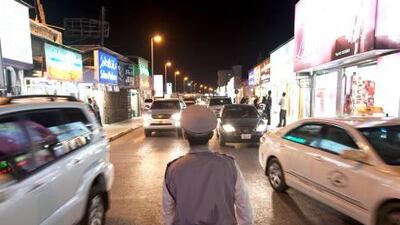RAS AL KHAIMAH // For many, the month of Ramadan is one of spiritual transformation, but as any beautician will tell you, the days before Eid are also a time of physical transformation.
Women and men spend dozens of hours and thousands of dirhams to look their best for the festival.
The Moroccan stylist Amal Al Wadeh, 29, is so dedicated to helping them do so that she does not sleep for three days before Eid.
"C'est très, très magnifique," said the 29-year-old, who has already prepared herself with black henna up to her knees and elbows. "We don't sleep but it's only for one or two days, no problem. Eid is family, it's toys, it's babies, it's hair, it's happiness. It's very happy and very exhausting."
For three days before Eid, the Lovly Bueaty Centre [sic] will serve 200 customers a day instead of the 50 it would normally cater to on a busy night in other months. Most women arrive between 11pm and 3am.
Tradition holds that worshippers attend early Eid prayers in their finest attire. "God is beautiful and he loves his people to be beautiful," said Aisha Al Ali, 21, her face covered in a white goo.
The regime begins weeks before Eid and includes facials, pedicures, manicures, steam baths, henna, hair styling, waxing and massages.
Aisha's older sister Wadha, 28, opts for henna alone. She has put her energy and money into fashion instead of the salon.
Over the three days of Eid she will wear dozens of modern dresses bought at malls in Dubai and Abu Dhabi. Wardrobe planning began months ago on a trip to the US, where Wadha bought her bags, shoes and accessories. She will wear four dresses on the first day alone.
Of course, to keep her grandmother happy she will wear one traditional dress on the first morning of Eid - tailor-made and hand-embroidered in Ras Al Khaimah.
The secret to the city's best-dressed women is found in the Dhafran neighbourhood, an area of dusty streets and ramshackle huts.
Lace nightgowns and embroidered robes hang from shop windows but there are no female shoppers in these dark lanes; they do their shopping a few blocks away in the shimmering market of Kuwaiti Street.
But the designers come to Dhafran for its embroiderers. Artists work around the clock in the days before Eid to ensure that every sequin and rhinestone is in its place.
Business doubles before Eid.
Iskandar Faisal, an embroiderer at Al Reeouf Ladies Garments, works throughout the night in his uncle's shop. He considers it his duty to make women beautiful.
At just 22 years of age, he already has six years' experience and a library of scrapbooks with different embroidery styles.
Mr Faisal's father is a bodybuilder who runs a chain of food supplement stores in Pakistan but Mr Faisal prefers to work for others, though he never meets his patrons or sees his creations modelled. "I have my own mind," he said. "I like to work, I like to make design."
When Eid arrives he will reward himself with new shoes, new trousers, a new shirt and a trip to the Sharjah beach and Carrefour in Ajman. His excitement and pride in his work is evident.
A few blocks away, traffic at the Kuwaiti Street market has reached a standstill. Men measure their sons for new kanduras, vendors place buckets of henna powder to lure patrons into their shops and bakers battle with impatient drivers to make pastry deliveries in the hours after midnight. Families crowd the gold and glass counters of chocolatiers on the corniche, in the last-minute rush to be ready when relatives knock at the door.
Still, not everyone is enamoured by the Eid rush.
Taxi drivers caught in the midnight chaos are quick to grumble to their customers.
"Shopping? Haircuts?" said Mumta Ali, a taxi driver of 21 from Pakistan. "How can I get a haircut? We don't even know yet if it's Eid tomorrow."

